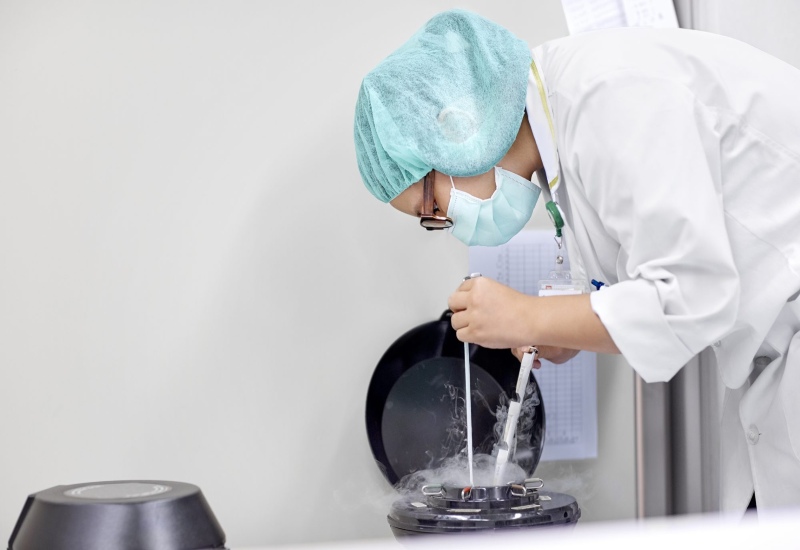For girls with Turner Syndrome, loss of fertility is a very real concern. A genetic condition affecting 1 in 2,500 females, Turner Syndrome results from the partial or complete absence of one X chromosome. It can affect all or some of the cells in the body, leading to a number of developmental issues. One of these problems is an extreme risk of premature ovarian failure and, in fact, more than 90 percent of girls with Turner Syndrome exhaust their supply of eggs before reaching puberty. Of the remaining 10 percent, most will be infertile by the time they reach adulthood. In generations past, this was an insurmountable problem. However, recent research has brought to light fertility preservation options for females with Turner Syndrome that were not available just a few years ago.
Turner Syndrome, first identified by Henri Turner, a physician in Oklahoma, in 1938, is often diagnosed prenatally or in early childhood. It comes with a host of medical issues, including heart defects, high blood pressure, hearing loss, vision problems, malformation of the kidneys, autoimmune disorders, and skeletal problems, as well as learning disabilities and mental health issues. Another problem associated with Turner Syndrome is an extremely slow rate of growth during childhood, with no growth spurt in adolescence. Because of this, adult women with Turner Syndrome average about four feet eight inches in height. There’s no known solution for many of these issues, including the problem of stunted growth, but science is making headway with fertility preservation.
Fertility preservation for females involves helping them retain the ability to have children using their own eggs. Methods for preserving female fertility have been developed in part to help women who need chemotherapy or radiation treatments that will damage their ovaries. Increasingly, those methods are being used for other medical conditions as well, including Turner’s Syndrome. There are currently two common methods of fertility preservation.
- Egg freezing, also called mature oocyte cryopreservation involves harvesting mature eggs from the ovaries. The eggs are then frozen without being fertilized and stored so that they can be used at a later date. This process has been in use since the 1980s, and the techniques have gotten better as time and technology have progressed. For adult women with cancer, fertilizing the eggs before freezing them is often the best solution, because frozen embryos are stronger than frozen eggs. However, for women without partners or girls who are young, fertilizing the eggs is not practical. Therefore, for most girls with Turner Syndrome, freezing unfertilized eggs is the only viable option. It has been demonstrated that girls as young as 13 can safely undergo egg retrieval.
- Ovarian tissue cryopreservation freezes the ovary itself. Because the outer layer of each ovary contains many immature eggs, it is possible to remove part or all of the ovary and cryogenically preserve it. This procedure is still in the experimental phase, but it has been successfully used in cancer patients and can save numerous eggs to be used in the future. It’s an outpatient laparoscopic procedure, and over one third of women who have undergone this technique before chemotherapy have been able to have at least one child afterwards.
While both of these techniques have proved effective in preserving the fertility of women with cancer and other medical issues, there’s not much information on their efficacy for girls with Turner Syndrome. This is because these procedures are relatively new and have only in recent years been used for Turner Syndrome patients. Because these girls have not yet reached childbearing age, there’s no way to know whether or not they will be able to conceive. However, this does not mean that there is cause to believe they won’t be able to have children, just that more time and study is needed to gauge the results of egg and ovary freezing in girls with Turner Syndrome.
Because Turner Syndrome so rapidly diminishes fertility, it’s important to be proactive with Turner Syndrome patients at an early age. This does not mean subjecting prepubescent girls to invasive egg-retrieval or ovary removal processes indiscriminately. Rather, it means that once a diagnosis of Turner Syndrome has been made, families need to seek fertility counselling as quickly as possible. For very young girls, it’s imperative to closely monitor fertility, so that the doctors can intervene when it becomes necessary. While it’s preferable to allow small children to develop to the point where more established egg freezing procedures can be performed, rather than experimental ovarian tissue freezing, it’s not always practical. Turner Syndrome can deplete the supply of eggs very quickly, within the first few years of life. For girls with viable immature eggs, ovarian freezing may be the best option.
In order to monitor fertility, it’s recommended to look at anti-Müllerian hormone (AMH), a reliable indicator of the number of immature eggs present in the ovaries. Frequent monitoring allows doctors to identify when the drop in eggs is problematic and take action only when it’s absolutely necessary for fertility preservation. The rapid depletion of eggs is demonstrated by a consistent drop in AMH levels, sending them below the appropriate level. When this rapid loss occurs, fertility preservation is needed.
Even though it’s still considered experimental, ovarian cryopreservation is being used in children who have other medical issues, as well. For example, those with childhood cancer face the same risks to their fertility when undergoing treatment as their adult counterparts. It makes sense that a pediatric fertility specialist would recommend the preservation of fertility to these young patients.
Cryopreservation involves surgically removing, freezing, and storing the ovary or ovarian tissue. A child with cancer can then undergo treatment without concern about damaging the ovaries. Later, when she is an adult and decides she is ready to have children, the ovary can be implanted back into the body and natural conception can be attempted. It is also possible to allow the immature ovarian follicles to develop into eggs. Pregnancy can then be attempted through in-vitro fertilization. It is important to note that, unlike children with cancer, Turner Syndrome patients are likely to have follicles of diminished quality, which can have a negative impact on fertility preservation. While there is no guarantee of a successful pregnancy, physicians and scientists are working to make cryopreservation of ovaries a standard procedure with good success rates. As the science progresses, this and other methods of preserving fertility will become more commonplace and successful.
Another factor to consider is that women with Turner Syndrome have a higher than usual risk of problems with pregnancy, including spontaneous abortion, birth defects, and risks to the mother’s health. Therefore, while they may desire to become genetic parents, it’s sometimes better for those with Turner Syndrome to try alternatives like egg donation, gestational surrogacy, or adoption. The challenge, of course, is that the decision to preserve fertility must often be made by the parents, before the child is old enough to understand her options. That’s why physical examination and fertility counselling are vital as soon as Turner Syndrome is diagnosed. It should also be noted that there is a spectrum involved in Turner Syndrome, so the effects are different for different women. For example, those with the mosaic variation of Turner Syndrome, in which both normal and abnormal cell lines are present, are more likely to experience spontaneous puberty and spontaneous pregnancy than those with the more severe monosomic karyotype. A specialist can help determine the severity of the patient’s condition and the likelihood of successful preservation of fertility before any major decisions are made.
No matter why you need help with your fertility, you’ll find compassionate care NewLife Fertility, where we strive to successfully assess your needs and apply effective services that work best for you. We are committed to providing patient-centered, effective, innovative, and safe reproductive care in order to help people fulfil their dreams of a healthy family. Beyond just providing fertility treatment, we instill hope with our advice, experience, and a proven track record of success for infertility patients. Since 2004, we’ve provided the comprehensive care that is essential to successful fertility outcomes, and our success rates have made us one of the top fertility centres in Canada. For more information or to schedule an appointment, contact us through our website.



